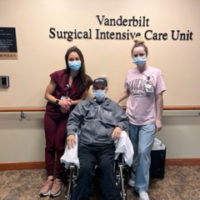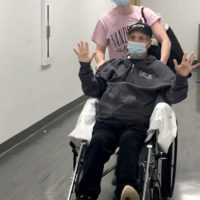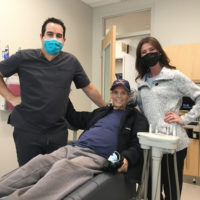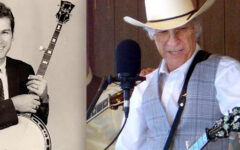
Mark Newton has been a presence in bluegrass music for most of his life, starting out playing with his father’s group in Fredericksburg, VA when he was 14 years old. His career took off quickly with stints in prominent touring groups Heights of Grass, Knoxville Grass, and Virginia Squires in the lates 1970s and ’80s. His recording of Painted Lady with Knoxville Grass in 1981 was a big hit in bluegrass, and remains a popular song at jam sessions to this day.
Along the way he worked beside some of the top pickers and singers of the time, including Sammy Shelor, Rickie and Ronnie Simpkins, Paul Brewster, and several others. Mark went on to record a number of projects as a solo artist, and took over the artistic management of the Graves Mountain Festival of Music near Culpepper, VA for many years. There he organized strong talent lineups as well as unique collaborations of artists that festival goers came to expect and look forward to each year.
But twenty years ago next month, his life changed dramatically when he received an unexpected diagnosis, and began a battle for his health that was only finalized when he received a liver transplant on February 26 at 1:00 a.m. The outcome was never certain, and when we spoke recently about his recovery, Mark made it quite clear that he had many years of wondering if relief would ever come. And he says that he stared death in the face several times.
For Mark, as he begins a new life absent his long struggle with liver disease, it is all about recognition of the miracle that has saved his life, gratitude to the people who have given him this hope, and a mission to alert others, especially in his chosen field of music, of the dangers of Hepatitis C.
But mostly, he gives praise to God who he knows brought him through all of this.
“I thank my Lord and Savior, Jesus Christ. You wouldn’t believe the prayers I have been getting from people all over the world. And I give thanks to Dr. Roman Peri, my Gastroenterologist at Vanderbilt University Hospital. I refer to the liver people at Vandy as my Dream Team, and he is the captain.
I want people to know that they can have hope. Even when you see the darkest time, there is still hope.”
Let’s backup a bit, and look at how this long ordeal began. Newton and his wife, Tami, had moved to Nashville where they were raising their daughter, Carly, and things were looking up for the family. Mark’s career was going well, and the future looked rosy.
Mark remembers it well, as it all started in April of 2002 as final preparations were being made for his time at the Graves Mountain festival, which was set to celebrate its 10th Anniversary in May.
“It was 20 years ago in April. I was outside cutting the grass, and I noticed my breath was short. I also noticed that my skin was looking grey. I’m old school, and I was slow to get to the doctor. So I figured I would go to Graves Mountain, and set up an appointment when I got back. People I saw at the festival mentioned that I just didn’t look good. That night I started throwing up blood – four or five times. My friend Steve Johnson, who had medical training, was staying a few rooms down, and he came down to look at me. From there I was off to the UVA Medical Center in Charlottesville, and within a few minutes a doctor came in with a diagnosis of Hepatitis C and cirrhosis of the liver.”
Newton quickly learned that the damage to his liver was irreversible, and that he was past the stage where lifestyle changes and medication can be expected to prevent the disease from progressing. He also discovered that cirrhosis this advanced can lead to liver failure, for which transplantation of a healthy liver is likely the only option.
As it happens, Mark’s cirrhosis was caused by an undiagnosed case of Hepatitis C, which he had been living with for an unknown period of time, but long enough to have caused extensive liver damage. The disease is caused by a virus, most commonly transmitted by blood to blood contamination, as when people share a needle to inject themselves after it being used by an infected person.
But Mark said that, while he won’t claim that he never tried drugs in his youth, he never injected himself with anything.
“I guess I had Hep C that had laid dormant in my body for years. I never did needles or blood transfusions, so I don’t know how I got exposed.”
Over the next two decades there were a number of episodes that required hospitalization, and a couple of close calls. But typically, Newton recovered and went back to a fairly normal life. But towards the end of 2021, he got quite ill and was told that his liver was failing.
We spoke with his primary physician, Dr. Roman Peri, who deflected Mark’s high praise a bit, and turned it back to the Newton family.
“Mark gives me far too much credit. It’s a real team approach, and requires a real strength and wherewithal of the whole family. Dealing with liver failure is difficult and life changing.
Whenever someone presents with these symptoms, the idea that a transplant may be required occurs to us. I tell people routinely that we don’t do transplants for cirrhosis, we wait until there is actual liver failure.
The important message is to recognize the risk of failing liver function, and that there is screening available. Every patient should be screened for Hep C. There are all kinds of people who are infected with the virus. It doesn’t cause any symptoms right away, but it can cause damage over decades. They may not even know they have it until they start vomiting blood. That is why now the recommendation is that everyone 18 or older be screened for Hep C. It used to be to screen only people with risk factors, but we missed so many people that we now want to screen everyone.
Once diagnosed, a patient needs to get on the radar of professionals who can deal with the disease. And recognizing that even cirrhosis can be treated. The waiting period for transplant can be devastating. There are a limited number of livers available, and the MELD score was developed to rate people by the degree of liver function. But it doesn’t take into account the symptoms, and the misery, the patient may be experiencing.
It’s important to recognize that this is in God’s hands. When an organ becomes available an opportunity arises to save someone’s life.”
Dr. Peri specifically gave credit to Tami Newton, saying that she was a big part of the reason Mark survived. And Mark, himself, was quick to second that thought.
“My wife is my #1 caretaker, my daughter #2, and music #3. Tami has been there and on top of everything.”
And in what was becoming a pattern in this conversation, she passed it right back to him.
“One thing Mark did right is that the minute the doctors told him don’t ever have a drink again, he took them seriously. The musician’s life is tough, but Mark knew that he had to heed the doctor’s advice. From that moment on, he never drank another drop. A lot of musicians couldn’t find the strength to do that. I so very proud of my husband. Liver disease is not for the faint of heart.”
Mark responded that his own drinking probably made the disease bubble up faster, but by the time he was diagnosed, the damage had been done.
So once he was in liver failure, transplant became the topic of discussion, and Dr. Peri said that it was quickly becoming dire.
“Mark was spending as much time in as out of the hospital. His symptoms included tremors, balance problems, cramps, loss of focus… all of those things, plus fatigue, bleeding, fluid retention… and hernias can develop from the fluid retention.”
And to add insult to his already frightening condition, he had to have all his teeth extracted.
“I lost my teeth. In order to get on the transplant list you have to go through a battery of tests to ensure that you are strong enough to go through the surgery. They found that I had a gum disease so I had to have all my teeth pulled to clear that up.”
Newton recalls that the confusion, known as Hepatic Encephalopathy, was the worst for him.
“I wouldn’t wish this on anybody. Liver disease is a horrible, horrible experience. When you go into failure, all these other conditions hit. Then confusion can just take over. I must have had a half dozen terrible episodes that took me to the hospital when I didn’t know who I was.
You just can’t believe it. Two days before my surgery I thought I was going to die in that hospital. I was trying to work through all that at a time when I couldn’t communicate because I was hooked up to all the machines.”
He’s not being dramatic with that last statement. His doctors had told him that unless a liver became available for transplant in the next few days, he was indeed likely to die.
But the liver did arrive, so Mark was awakened in the hospital with the news, while the transplant team was assembled as the liver was transported to Vanderbilt. And Newton said that when he first woke from the transplant surgery, he immediately recognized that he felt better than he had in months.
“It’s a miracle. I don’t know how else to describe it. I’m still kind of shocked. I’m feeling better every day, and I know I’ll be on a lot of medication for a while, but I can truly look forward to living my life again.”
Dr. Peri said that Mark had been an ideal patient, dotting all the “i”s and crossing the “t”s.
“The anticipation is that this is just the start of getting healthier and healthier. The plan is to get you back to a normal life.
Transplant patients form a community. They are cheering on our doctors, nurses, each other. It’s amazing to see these men and women coming through transplantation. It is a joyous, joyous moment.”
The conversation then took a lighter turn as Mark discussed his recovery. “It should be six months to a year,” he said. “Right now my appetite is a challenge. I need to want to eat so I can build back my muscle mass.” Dr. Peri interjected quickly that, “Over the next couple months I think you will see your energy dramatically improve. When you get back to performing, I want to be invited to a concert.”
Mark then laughed and said, “I was going to ask you to be my manager!”
Newton was recuperating from home within a week of his surgery, where he has developed something of a missionary zeal to tell his fellow artists and musicians about the importance of Hep C screening.
“I lost my dad at 55 from throat cancer. He was old school and just wouldn’t listen when people told him to see a doctor. I encourage all my friends to get screened for Hep C. It’s just a simple blood test.”
With his recovery well on its way, Mark is planning to be at the Graves Mountain Festival in late May, and he is already working on promotion for this year’s event. So don’t be surprised if he asks you about Hep C screening when you next see him.
“I was on the verge of dying, and had been there way too many times over the last 19 years.
I’m one of the lucky ones who recovered from liver disease.”
And with his new lease on life, getting back to music is on his mind again.
“All this stuff happened over Thanksgiving, Christmas… we are looking forward to a time when we can enjoy a real vacation, and celebrate the holidays normally.
I have hope. There are things I still want to do. I just want to be able to put my art out there and see what people think.”
With an eye towards recording again, Newton is already in discussion with Tony Wray, a producer with Pinecastle Records, about a new project.
And he has new shiny teeth!
“I just got my dentures last week. A little step at a time.”
Mark Newton is back, ladies and gentlemen, after being as close to the abyss as one can imagine. We haven’t heard the last of him, that’s for sure.










